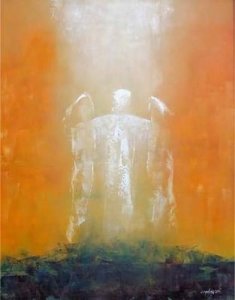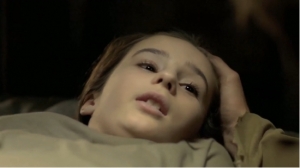About eight days after these sayings he took with him Peter and John and James and went up on the mountain to pray. And as he was praying, the appearance of his face was altered, and his clothing became dazzling white. And behold, two men were talking with him, Moses and Elijah, who appeared in glory and spoke of his departure, which he was about to accomplish at Jerusalem. Luke 9:28-31
Eight busy days pass—preaching healing traveling—before Jesus has more alone time. He takes his inner inner circle with him this time: Peter the natural leader, John and disciple he loved, and James . . . just because. Imagine these three, doubtless pleased (and proud) to be selected to accompany the Master. They might even strut a little, if it’s possible to strut while climbing a mountain, exchanging excited whispers about what might be waiting for them up there. They sense a new purpose in Jesus, a certain intensity that tells them something big is about to happen. And they’re in on it! How lucky is that?
(Looking ahead: James will be the first of the twelve to die, and his brother John the last.)
The reason he takes them: a special executive meeting has been called, and they are witnesses. But while he is praying, a deep sleep falls upon them.
Remember Abraham in Genesis 15? After assembling the animals (in halves) for the covenant ceremony, a deep sleep overwhelms him when the LORD approaches, and Abraham awakes to terror and darkness. Now the Father is approaching the mountain where his Son prays, sending ahead the embodiment of Law and Prophesy, his great Old Testament witnesses and mediators. The burden of history rolls up the mountain with them: centuries of sacrifice and blood and burning offal; of lawlessness and judgment and captivity. And here the burden stops.
Moses and Elijah—the real men, not their ghosts—are learning what it was all for. The plot and its  essential elements are being explained by the author himself. Angels have longed to look into these things, and now the great secret is cracking open, degree by degree. Are the two great witnesses here to encourage Jesus, or to be informed? Could be either, or both.
essential elements are being explained by the author himself. Angels have longed to look into these things, and now the great secret is cracking open, degree by degree. Are the two great witnesses here to encourage Jesus, or to be informed? Could be either, or both.
Peter, James, and John stir from their deep sleep while the conversation is going on. They hear voices first, speaking. Maybe not in a language they know, but they are allowed to catch the drift: “departure” in Jerusalem? They look up, and their eyes burn. They know it’s Jesus, but his face! like a bolt of lightning, and his clothes! So dazzling white they burn. As their eyes become adjusted they see the two figures with him–also radiant–and somehow know who they are. Moses and Elijah have burned a hole in time and hold the moment suspended, with Peter, James, and John inside. Then it tops, the glory begins to fade, and Peter has to open his big mouth.
Mark tells us he didn’t what he was saying, but apparently he felt the need to say something. Typical. He proposes three tabernacles, or dwelling places, because Jesus is surely equal to Moses and Elijah! Or maybe even above those two, but still, we have to have three tents right here.
Or perhaps, as some commentators believe, he wanted to stay in this moment forever. Whatever his motivation, he was silenced by the cloud—a cloud reminiscent of another mountain, well known to Moses, where God came down and spoke directly to his people and terrified them so much they begged he never do it again.
No lightning and earthquakes this time, just the voice. This is the voice, remember, that summoned light and separated sea from sky and brought green leaves and grass springing joyfully from barren land. At its sound the trembling deer give birth and all in his temple cry “Glory!” That’s the voice these mortal men hear, and even understand—it crowds their crowded minds, packs them with a handful of words that swell and echo until their heads threaten to explode. This is my beloved son. Listen to him!
Then time shrinks to its normal size, and “only Jesus was found.”
Only him, and all him. Not the successor to Moses and Elijah, but their author and finisher.
For the original post in this series, go here.
Next>









